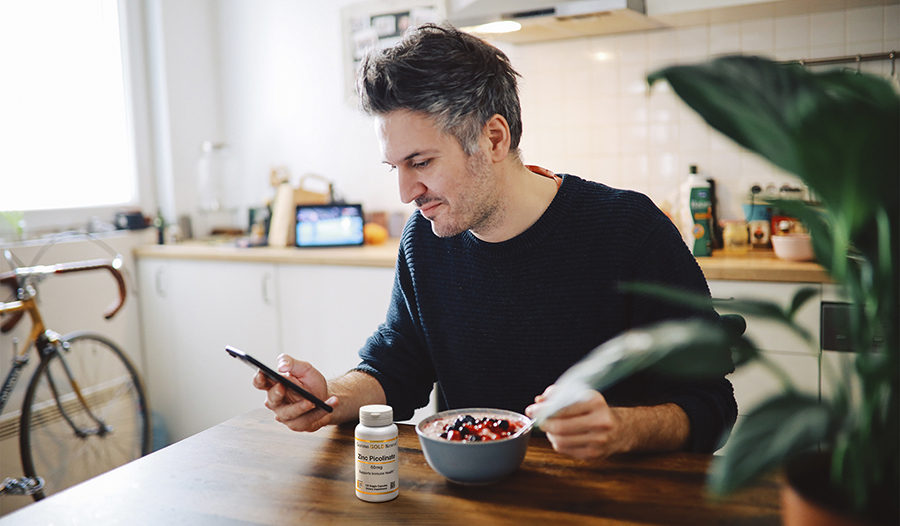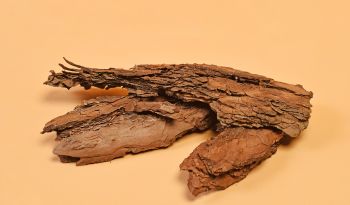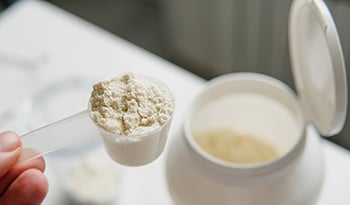7 Natural Ways to Support Male Fertility, According to a Doctor

An estimated 60–80 million couples globally are affected by fertility problems, with male fertility difficulties leading to about 40% of cases globally. For men, fertility difficulty is defined as the inability to conceive with a fertile woman for a minimum of one year of unprotected sex. Male fertility difficulties are multifactorial and can get attributed to sperm quality or poor libido.
Sperm quality factors include low sperm count or decreased sperm motility. On the other hand, libido factors that contribute to male fertility problems include sexual dysfunction like erectile or ejaculatory dysfunction and endocrinological causes like low testosterone.
Male fertility difficulties are usually individualized and remember that not all men may benefit from the same lifestyle modification. This article will explore seven natural ways that can positively impact male fertility and improve overall male health.
1. Zinc
Zinc is found throughout the human body and helps the body’s immune system fight infections. It is also needed to help make proteins and deoxynucleic acid (DNA), the genetic material that is in all our cells, and the genetic material that gets passed on to offspring. Supplementing with zinc may help protect the genetic material in the developing sperm. According to the Human Reproduction Update Journal, decreased zinc levels have been associated with reduced sperm ability to fertilize an egg. Additionally, in a study published in the BioMed Central Urology journal comparing 37 fertile and 37 infertile men with decreased sperm motility; supplementing with 200 mg of zinc sulfate for 3 months showed an increase in sperm motility, percentage, and volume in both fertile and infertile men.
Men need about 11 mg of zinc per day in their diet. It is a great mineral to supplement with calcium or magnesium. If you suffer from chronic gastrointestinal conditions, are vegetarian, or have blood disorders, consider supplementing your diet with zinc, especially if you and your partner are trying to conceive.
2. Vitamin C and E
Vitamin C is an essential vitamin for the body as it is required to make the structural protein that holds our body together, collagen. Vitamin C can be found in high concentrations of semen. In addition to serving as a cofactor in the synthesis of collagen, it also can serve as an antioxidant and prevent damage to DNA from reactive oxygen species (ROS), or free radicals. Free radicals are compounds made when our bodies use nutrients to make energy or when sperm develop in the male testes. Too much ROS can lead to cellular damage of the developing sperm, especially in the mitochondria, the powerhouse of the sperm. An abundance of free radicals may also damage the fatty acids that make up the protective membrane of the sperm, exposing the genetic material it carries to the environment, leading to DNA damage before it can fertilize an egg.
Vitamin E is another vitamin that helps neutralize free radicals and protect cell membranes from the damage of reactive oxygen species. It also helps dilate blood vessels, which is important in maintaining an erection when trying to conceive. In people undergoing in vitro fertilization, or IVF, sperm with higher rates of DNA damage led to lower fertility rates. Supplementing with 1 g of Vitamin E and C helped improve egg fertilization and reduced sperm DNA damage when undergoing IVF. Finally, Vitamin E may also help with sperm motility and its morphology in men supplementing with 400 IU of Vitamin E for 100 days.
3. Tribulus Terrestris Extract
Tribulus terrestris is a plant that grows in Europe and Asia and has been used in many traditional Chinese and Indian medicine as a sexual booster. The herb has reported positive effects on both male and female libido with reports of it stimulating the natural release of testosterone. Its extract has been shown to have a positive effect on sperm motility and viability. Although the exact mechanism is still unknown, it is believed that it may be due to the minerals like zinc, calcium, and antioxidants like Vitamin C that can be found in T. terrestris. Additionally, T. terrestris extract has shown relaxing pro-erectile properties, with its supplementation allowing for improving relaxation of the corpus cavernosum tissue leading to sustained erections and increased sexual drive.
4. Grape Seed Extract
Grape seed extract, or grapevine, has reported anti-inflammatory and antioxidant properties. One of the many antioxidants it contains is Vitamin C and Vitamin E. Supplementing with this extract may also help with increasing sperm motility, and it has also been shown to protect sperm DNA damage. In addition to helping with fertility, this extract may also have cardiovascular protective properties, which may help you live a healthy life and protect the tiny vessels in the penile erectile tissue allowing for continued blood flow.
5. L-Arginine
One of the factors contributing to fertility difficulties is erectile dysfunction, or the inability to maintain an erection that is firm enough to have sex. There are many causes of erectile dysfunction, but one of them is decreased penile blood flow. In a study by Gur et al. in the Journal of Urology, in vitro samples of the corpus cavernosum, the tissue that forms the penile shaft, were exposed to L-Arginine, which resulted in prolonged relaxation. As the tissue in the penis relaxes, more blood flows to the area, resulting in a sustained erection. L-Arginine is an amino acid found in foods high in protein. When taken as a dietary supplement, it has been shown to increase exercise performance and may also help with fertility.
In the body, L-Arginine is converted to nitric oxide, a compound that helps relax blood vessels and increase blood flow. This helps deliver more oxygen and nutrients, and in men with erectile dysfunction, increased blood flow may help maintain an erection. Another benefit of L-Arginine supplementation is the potential to have a positive impact on your athletic performance. A review by Viribay et al. showed that the effective dose of arginine supplementation to have improved aerobic and anaerobic performances was 10–11 g per day 60–90 minutes before engaging in strenuous activity. Exercise is another way to help boost your stamina and help with fertility.
6. Reducing Alcohol
Alcohol consumption can bring negative reproductive risks not only to women who are pregnant but to couples who are trying to conceive, and in men, it can lead to difficulties with fertility. Heavy alcohol consumption in men, more than 2 drinks in a day, is associated with decreased release of gonadotropin, the hormone in the brain that instructs the sex organs to produce sex hormones. For men, this results in shrinking of the testicles and decreased levels of testosterone, the male sex hormone.
Heavy alcohol use in men has also been associated with having higher estrogen levels, the female sex hormone, in the body since the alcohol will prevent the liver from metabolizing this hormone. Finally, acute excess consumption of alcohol is associated with sexual dysfunction in men, such as erectile dysfunction and even ejaculatory dysfunction. These negative effects of alcohol have not been found in men with low to moderate consumption of alcohol.
7. Healthy Diet and Exercise
Finally, nutrition and lifestyle factors play a crucial role in the normal function of the reproductive system for both men and women. Male obesity and processed food diets have been associated with impaired sperm mobility and development. Diets high in saturated and trans fats may lead to disruption of testicular metabolism, resulting in poor sperm development. Consuming processed foods also exposes the reproductive organs to higher levels of ROS, resulting in more cellular damage to the developing sperm. High consumption of fruits, green vegetables, fish, chicken, whole grains, and low-fat dairy products have the potential to positively impact sperm quality in men.
Obesity and a sedentary lifestyle have also been associated with decreased testosterone, leading to decreased sperm production. Moderate levels of exercise have been shown to have some positive impact on sperm motility and volume. Resistance training, weightlifting, or bodyweight exercises have improved reproductive markers in men and improved mobility and DNA integrity in sperm. Other exercises like cycling have shown decreased sperm motility in men who cycle 1.5 hours or more per day, with improvement after doing more moderate aerobic exercises.
Remember that many factors contribute to male fertility, and these are only a few of the things that help boost male fertility. What works for some men, may not work for others, but do remember that fertility and libido can also be an overall indicator of your general health. Thus, if you have continued to have male fertility difficulties, consult with your doctor. Male fertility problems are common; you are not alone. There is no guaranteed fix, but many of the components mentioned here are not only geared to boost fertility, but also to help you lead a healthy lifestyle.
References:
- Adewoyin M, Ibrahim M, Roszaman R, et al. Male Infertility: The Effect of Natural Antioxidants and Phytocompounds on Seminal Oxidative Stress. Diseases. 2017;5(1):9. Published 2017 Mar 1. doi:10.3390/diseases5010009
- Ahmadi S, Bashiri R, Ghadiri-Anari A, Nadjarzadeh A. Antioxidant supplements and semen parameters: An evidence-based review. Int J Reprod Biomed. 2016;14(12):729-736.
- Ebisch IM, Thomas CM, Peters WH, Braat DD, Steegers-Theunissen RP. The importance of folate, zinc and antioxidants in the pathogenesis and prevention of subfertility. Hum Reprod Update. 2007;13(2):163-174. doi:10.1093/humupd/dml054
- Erectile dysfunction. Mayo Clinic. https://www.mayoclinic.org/diseases-conditions/erectile-dysfunction/symptoms-causes/syc-20355776. Published December 3, 2021.
- a systematic review covering 2 decades. Nutr Rev. 2016;74(2):118-130. doi:10.1093/nutrit/nuv059
- Gur S, Kadowitz PJ, Trost L, Hellstrom WJ. Optimizing nitric oxide production by time dependent L-arginine administration in isolated human corpus cavernosum. J Urol. 2007;178(4 Pt 1):1543-1548. doi:10.1016/j.juro.2007.05.121
- Hadwan MH, Almashhedy LA, Alsalman AR. Oral zinc supplementation restores high molecular weight seminal zinc binding protein to normal value in Iraqi infertile men. BMC Urol. 2012;12:32. Published 2012 Nov 13. doi:10.1186/1471-2490-12-32
- Hajizadeh Maleki B, Tartibian B. Resistance exercise modulates male factor infertility through anti-inflammatory and antioxidative mechanisms in infertile men: A RCT. Life Sci. 2018;203:150-160. doi:10.1016/j.lfs.2018.04.039
- Khaleghi S, Bakhtiari M, Asadmobini A, Esmaeili F. Tribulus terrestris Extract Improves Human Sperm Parameters In Vitro. J Evid Based Complementary Altern Med. 2017;22(3):407-412. doi:10.1177/2156587216668110
- Office of dietary supplements - vitamin C. NIH Office of Dietary Supplements. https://ods.od.nih.gov/factsheets/VitaminC-Consumer/.
- Office of dietary supplements - vitamin E. NIH Office of Dietary Supplements. https://ods.od.nih.gov/factsheets/VitaminE-Consumer/.
- Office of dietary supplements - zinc. NIH Office of Dietary Supplements. https://ods.od.nih.gov/factsheets/Zinc-Consumer/.
- Semerdjieva IB, Zheljazkov VD. Chemical Constituents, Biological Properties, and Uses of Tribulus terrestris: A Review. Natural Product Communications. August 2019. doi:10.1177/1934578X19868394
- Tvrdá E, Massanyi P, Lukáč N. Physiological and pathological roles of free radicals in male reproduction. IntechOpen. https://www.intechopen.com/chapters/57417. Published December 20, 2017.
- Van Heertum K, Rossi B. Alcohol and fertility: how much is too much?. Fertil Res Pract. 2017;3:10. Published 2017 Jul 10. doi:10.1186/s40738-017-0037-x
- Viribay A, Burgos J, Fernández-Landa J, Seco-Calvo J, Mielgo-Ayuso J. Effects of Arginine Supplementation on Athletic Performance Based on Energy Metabolism: A Systematic Review and Meta-Analysis. Nutrients. 2020;12(5):1300. Published 2020 May 2. doi:10.3390/nu12051300
- https://pubmed.ncbi.nlm.nih.gov/26705308/
DISCLAIMER:This Wellness Hub does not intend to provide diagnosis...
















































































 Table of Contents
Table of Contents












